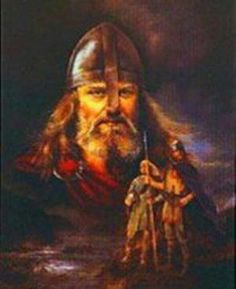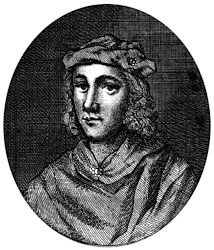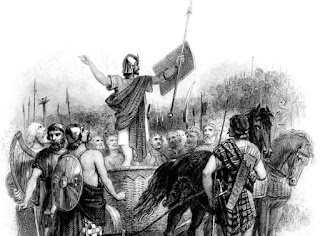A Merry Meeting
It was a tavern eating scene which caught the poetic imagination of Robert Burns when he arrived on his first visit to the Auld Toun in 1786 to work on the second edition of his poems with his publisher. The literati were keen to have his company at their elegant dinners, but Burns preferred the social mix of the tavern where the Lord Provost could be found sitting next to the humble caddie (porter). And it was in the taverns that he found inspiration for the bawdy lyrics, unfit for publication, which captured the riotous spirit of the age.
The tavern fare was more to his taste too. Particularly at Dowie's (his favourite), where the food was noted for its fine quality. Along with some excellent Edinburgh ale, there was a gamey dish of jugged hare and rich apple pie, flavoured with lemon and cinnamon, raisins, almonds and some finely chopped lemon and orange peel.
And later in the evening there would be plates of toast and cheese, known as a 'rarebit', the tangy cheese mix made by melting some ripe hard cheese on a plate in the hot hearth and mixing it with ale and a secret spicing while the bread was toasted in front of glowing coals.
It was not the kind of hamely fare which Burns was accustomed to. Broth, porridge and brose, hard oatcakes and ripe cheeses were more familiar daily food. Yet the tavern fare was not pretentious. Presentation was not considered important; it was the taste which mattered. Good-tasting food, which came from pots, or was roasted on spits, or grilled over hot coals, was served up - by today's standards - in a rough-and-ready way.
Long- boned chops of mutton were grasped from the broth pot and chewed unceremoniously. Slices of meat were carved off spit- roasts and eaten with fingers, potatoes were also hand-held. Communal eating from the pot continued, two eaters might sup from the same bowl of broth.
Shortly after Burns arrived in Edinburgh, an Ayrshire friend, Andrew Bruce, invited him to a family supper. Bruce's wife had made some haggis puddings for the supper using the pluck (innards) of the sheep, which she had bought from the Flesh Market. She had boiled, chopped and stuffed the sheeps' stomach bags full of the meat, oatmeal, onions and flavourings and they ate them that night, not with tatties and neeps, which were a meal in themselves, but by delving into the aromatic mix with a horn spoon while washing it down with some Edinburgh ale.
It is possible that this occasion may have been the inspiration for 'The Address to the Haggis', one of the few poems which Burns wrote during this first visit to Edinburgh. It appeared in the 1786 December issue of the Caledonian Mercury and in the January issue of the Scots Magazine. Choosing to celebrate a stuffed sheep's pudding, symbol of peasant thrift and ingenuity, Burns created a national eating institution, synonymous with values of sense and worth which he considered important in the Scots character.
Before he captured it for the Scots, haggis had been a common dish in England as well as in other continental countries. It appears originally in ancient Greece, the entrails of a sheep stuffed into the stomach bag. Yet from now on it was to became distinctively Scottish, inextricably linked with the celebration of Burns's birthday. The first Burns Suppers took place in the early nineteenth century and have continued, not only in Scotland, but around the world in immortal memory of the universal poet.
An early recipe for haggis comes from Susanna MacIver's Cookery and Pastry. As taught and practised by Mrs MacIver, teacher of those arts in Edinburgh. First published in 1773 and printed in Edinburgh, it was written at her pupils' request and was part of a general development in printed cookery books around this time. Susanna MacIver had begun her professional cooking by making and selling jams, chutneys, pickles and cakes and later she ran a cookery school for the well- to-do. She sold her cookery book privately from her house in
Stephens Law's Close.











Comments
Post a Comment